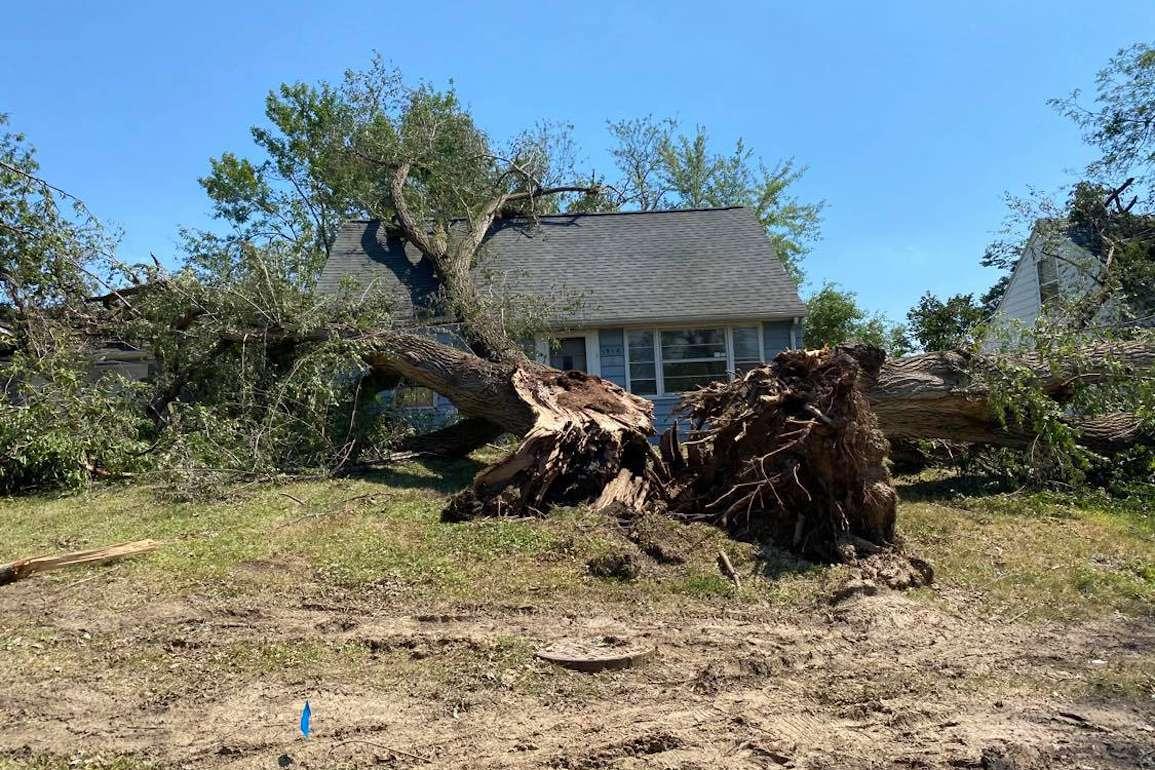Cedar Rapids condo dispute after derecho highlights HOA challenges
CEDAR RAPIDS — A couple of lawn chairs sit on the cracked concrete foundation that used to be Anne Clinton-Cirocco’s living room before the derecho struck a year ago.
The 71-year-old moved out of her condominium in February so workers could gut and rebuild the place after water damage from the severe Aug. 10, 2020, wind and rainstorm. She’s still living in a hotel, and little work has been done in the condo since April, she said.
“As good or bad as the contractor is, it’s the board’s fault for not managing this,” Clinton-Cirocco said of the homeowners association board for Lexington Green Unit 6, a 96-condo association south of 42nd Street NE.
AdvertismentClinton-Cirocco and a handful of neighbors are angry the board signed a contract with a public adjuster whose fee is 10 percent of all insurance payouts. They also want more input on changes — especially since they owe a share of all costs, including upgrades not everyone wants.
The dispute highlights the challenges that can arise in developments governed by HOAs. The number of HOAs in the United States skyrocketed from about 10,000 in the 1970s to more than 350,000 in 2019, the Community Associations Institute reports. The group estimated about 15 percent of Iowans live in neighborhoods within HOAs.
Steven Leidinger, a lawyer at Lynch Dallas PC in Cedar Rapids who often represents HOA boards, said associations have boomed because homeowners and cities want less responsibility for grass, drainage areas and snow removal in residential areas. In new neighborhoods, a developer may create an HOA to retain control of house color, lawn maintenance and other aesthetics while it continues to build and sell homes.
Leidinger hasn’t seen an increase in conflicts between boards and members since the derecho, but the stakes are higher.
“There are more large-scale problems,” he said. “It isn’t one owner with a leak in the roof, it’s the whole community. The question is ‘Whose responsibility is it unit wide?’”
Usually in condo buildings, the HOA owns and maintains the exterior (siding, roof, lawn) and individual owners are responsible for insuring their units. Because of the magnitude of damage in the derecho, the Lexington Green Unit 6 HOA’s master insurance policy overrode individual policies, Clinton-Cirocco said.
Newsletter Signup
Delivered to your inbox every day
EmailPlease waitYou will begin to receive our Daily News updates. Add newsletters@thegazette.com to your contacts.
The HOA board signed a contract with Miller Public Adjusters, of Appleton, Wis., according to HOA documents provide to The Gazette by homeowners. Public adjusters help property owners sort through insurance policies, document losses and negotiate settlements.

State law says in “catastrophic disaster,” public adjusters may charge fees no more than 10 percent of the insurance settlement or proceeds. That’s how much the Lexington Green Unit 6 HOA board agreed to pay Miller, according to HOA documents. The association now is assessing owners to cover the adjuster fee.
But the problem, according to Don Steger, 74, who also lives in the association, is that the board is upgrading the complex beyond what was damaged in the derecho.
“They said they would replace all the windows, all the doors and the air conditioning units even if they weren’t damaged,” Steger said. “I asked ‘Why is this?’ They said, ‘Because insurance is going to pay for it.’”
As the cost of the restoration grows, so do the bills for homeowners, he said.
Lexington Green Unit 6, in Cedar Rapids, awaits siding Aug. 9 as part of restoration after the Aug. 10, 2020, derecho. Some residents of the 96-unit complex are frustrated by decisions made by the homeowners association. (Cliff Jette/Freelance for The Gazette)The Lexington Green Unit 6 HOA board is made up of five owners, elected by the membership.
Al Ehler, HOA board president, did not return two phone messages and an email to try to find out more about the work at the complex and to get his version of events. The other four board members also did not return phone messages. Miller Public Adjusters and America’s Best Remodeling, the Dubuque company doing repairs, also did not respond to phone messages.
Steger and Clinton-Cirocco have asked for a special meeting of the association, which will be held later this month, they said.
Not all condo owners have had bad experiences with their HOA after the derecho.
Lori Riehle, 63, who lives in Executive Estates near the border of Cedar Rapids and Marion, said working with her HOA board after the storm knit the eight-unit group tighter together.
“We learned a lot as a homeowners association through this whole thing about who to trust with coverage, who to involve in negotiations and to document everything,” Riehle said. “Certainly we’ve had some people frustrated and disgruntled, but we’ve been able to work things out.”
Before buying a property in a homeowners association, Leidinger said people should carefully read the association’s declaration of covenants and bylaws, which will outline important details such as whether you can have pets and how common areas are maintained. These records also will outline what share of properties may be rental units.
“Most people when they buy a condo unit, don’t want to live in a rental community,” Leidinger said. “Unless you have rental restrictions in place, that can happen. If enough investors come in and buy enough units, they can seize control of that board.”
Prospective buyers also should look at the HOA’s finances to make sure the group has cash reserves for major projects, like roof replacement. If the complex has an elevator, there should be money for repairs or replacement, Leidinger said.
Iowa Code Chapter 499B says condo board meetings are open to members and the board must give members notice of meetings at least seven days in advance. The law also states “official records of the board of administration must be open to inspection and available for photocopying at reasonable times and places.”
Iowans who have concerns about how insurance claims are being filed in their HOA may file a complaint with the Iowa Insurance Division.
Comments: (319) 339-3157; erin.jordan@thegazette.com







